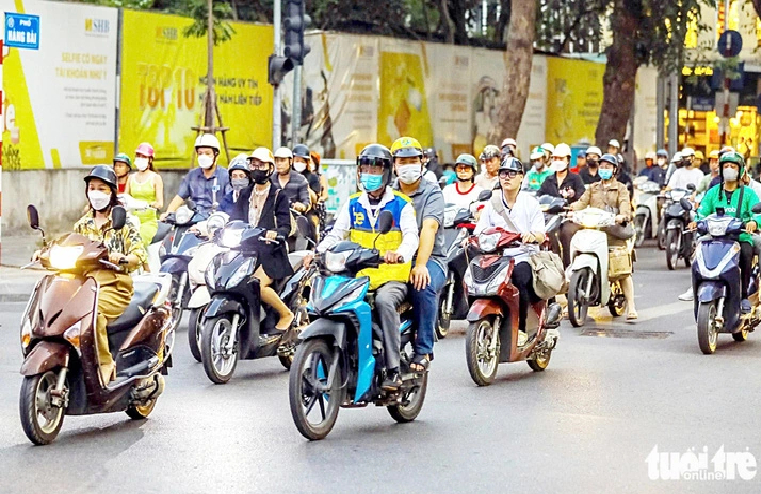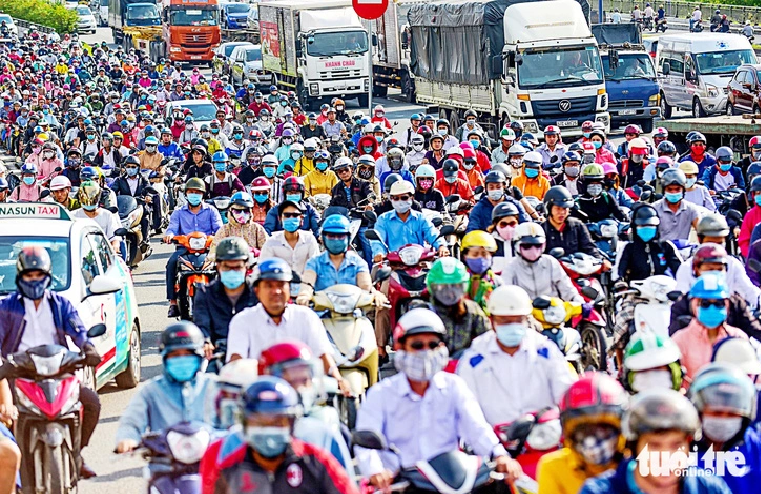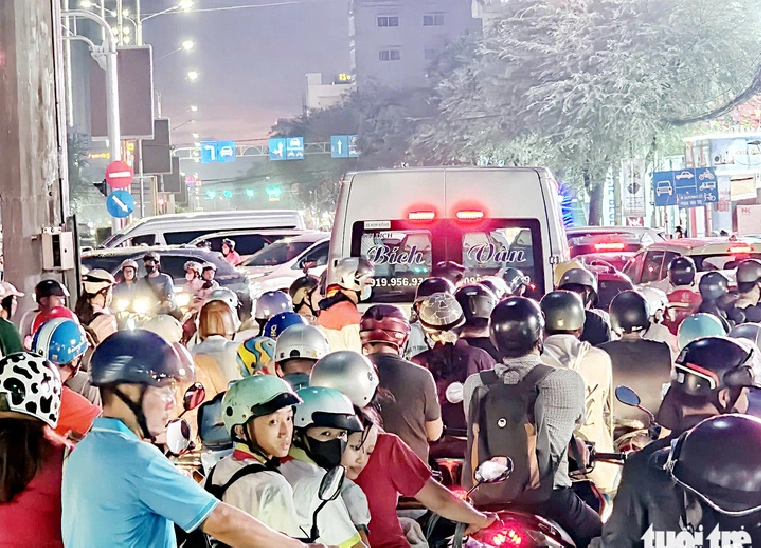Hanoi is developing a draft to mandate low-emission zones and effectively ban motorbikes from the inner city by 2030.
City authorities have identified low-emission zones as air pollution hotspots where high-polluting vehicles will be restricted.
These zones are set to encompass 12 inner districts, including Ba Dinh, Hoan Kiem, Dong Da, Hai Ba Trung, Thanh Xuan, Cau Giay, Hoang Mai, Tay Ho, Long Bien, Bac Tu Liem, Nam Tu Liem, and Ha Dong.
Other areas that may become low-emission zones include five suburban districts planned to become urban districts between 2020 and 2025: Dong Anh, Gia Lam, Thanh Tri, Hoai Duc, and Dan Phuong.
A planned district-level city in the north will encompass Dong Anh, Me Linh, and Soc Son Districts, alongside the urban areas of Hoa Lac and Xuan Mai.
Starting in early 2025, a pilot program will restrict vehicles, with a complete ban on motorbikes in low-emission zones by 2030.
Organizations and individuals will have 12 months to switch to low-emission vehicles or those meeting emissions standards to travel within these zones.
Initially, Hanoi will ban large-tonnage trucks powered by diesel oil, prioritize vehicles meeting Euro-4 emissions standards or higher, and collect fees from vehicles that fail to meet these benchmarks.
|
|
| People travel on motorbikes on Hang Bai Street in Hoan Kiem District, Hanoi. During peak hours, residents prefer motorbikes. Photo: Danh Khang / Tuoi Tre |
Assessing impacts
Assoc. Prof. Dr. Bui Thi An, a former member of the law-making National Assembly's Committee for Science, Technology, and Environmen, supported Hanoi’s plan to develop low-emission zones.
However, the capital city should develop a detailed scheme to provide alternative public transportation options for personal vehicles, ensuring public transport is convenient.
As many residents rely on their vehicles for their livelihoods, the city must proceed cautiously, noted An.
Hanoi must enhance the quality of public transport, particularly by improving bus route connectivity, before phasing out motorbikes.
Pham Dinh Tai, a 36-year-old resident, said he uses a motorbike to carry vegetables from suburban areas to marketplaces in inner-city districts for sale.
He has not figured out which vehicle he will use once motorbikes are banned.
Meanwhile, Dr. Nguyen Xuan Thuy, former director of the Transport Publishing House, advocated banning motorbikes and autos to ease congestion and pollution, cautioning that the impact on residents should be considered before any final decision is made.
Dr. Vo Kim Cuong, former deputy chief architect of Ho Chi Minh City, said that restricting personal vehicles will partially impact economic activities and residents' travel.
He recommended that Hanoi pilot the motorbike ban in select areas before expanding the policy.
This approach will help identify the vehicles subject to the policy and prioritize solutions to restrict cars first.
In preparation for the motorbike ban, Hanoi is enhancing public transport, particularly by focusing on metro lines and green bus routes.
The capital city set a target of phasing out diesel-powered buses and replacing them with electric vehicles in 2031-35.
Pursuant to the metro line development plan in 2024-45, Hanoi seeks to complete 12 metro lines totaling some 600 kilometers and requiring a combined investment of nearly US$50 billion.
Regarding green buses, Pham Dinh Tien, head of the Hanoi Public Transport Management Center under the municipal Department of Transport, said the city boasts 20 green bus routes, including 10 electric bus routes and 10 compressed natural gas bus routes, accounting for 17 percent of the total buses in the capital.
The percentage is expected to increase to 94 percent in 2026-31 and 100 percent by 2035.
Hanoi has examined a plan to zone and restrict motorbikes, aligning it with the infrastructure and capacity of the public passenger transport system, aiming for a complete prohibition on motorbikes in districts by 2030.
The city has measured motorbike and car emissions to develop solutions focused on enhancing air quality.
|
|
| If Ho Chi Minh City bans motorbikes while the public transport system fails to meet locals’ demand, the volume of cars will increase, worsening congestion. Photo: Quang Dinh / Tuoi Tre |
However, the city currently lacks solutions to support affected individuals, particularly motorbike owners, according to the Hanoi Department of Natural Resources and Environment.
To address this issue, Hanoi is tasking the Department of Labor, War Invalids, and Social Affairs with gathering statistics on individuals who earn their livelihoods using motorbikes and cyclos in the affected districts.
The department will then draw up a plan to support these individuals, which could include providing new job opportunities or helping them find work in unaffected areas.
Tran Van Truong, a 31-year-old resident in Hanoi, expressed his support for the plan, emphasizing the importance of having support policies for residents.
Race to develop public transport
Vu Duy Tung, director of Hai Phong City’s Department of Transport in northern Vietnam, stated that the city is focusing on developing public transport and reducing the use of personal vehicles, particularly motorbikes, in inner-city areas.
Hai Phong has already relocated coach stations out of the downtown area and improved public transport connections between these stations and the city center.
In the southern city of Can Tho, authorities are planning to expand the bus network as a precursor to limiting or banning motorcycles.
Nguyen Dang Khoa, deputy director of Can Tho’s Department of Transport, explained that the city will designate zones where motorbikes are restricted, depending on infrastructure and the capacity of the public transport system.
By 2030, Can Tho aims to limit or ban motorbikes in some downtown districts while expanding bus services to accommodate 20-30 percent of commuters.
Can Tho currently has 17 operational bus routes with a total length of over 735 kilometers. It plans to have 26 bus routes by 2025 totaling 1,052 kilometers in length.
|
|
| Traffic congestion on Hoa Binh Street in Ninh Kieu District, Can Tho City, southern Vietnam. Photo: Chi Quoc / Tuoi Tre |
Meanwhile, Da Nang City in the central region expects bus services to ease congestion and the overwhelmed infrastructure and environment. It has developed 20 bus routes and is on track to have six more by 2026.
Ho Chi Minh City will employ solutions to restrict personal vehicles once the urban railway system meets local commuters’ demand, according to Bui Hoa An, deputy director of the municipal Department of Transport.
The city is working toward a goal of 510 kilometers of urban railways completed by 2060. It plans to get 183 kilometers of metro lines operating by 2035 to serve 30-40 percent of commuters.
The city looks to have an additional 168 kilometers of metro lines by 2040, making up 40-50 percent of the public transport market share.
Like us on Facebook or follow us on Twitter to get the latest news about Vietnam!





Max: 1500 characters
There are no comments yet. Be the first to comment.